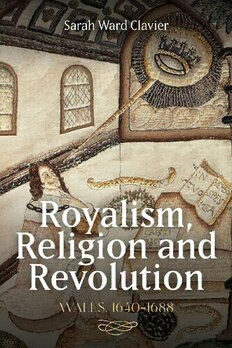
Royalism, Religion and Revolution: Wales, 1640-1688 PDF
Preview Royalism, Religion and Revolution: Wales, 1640-1688
STUDIES IN EARLY MODERN CULTURAL, POLITICAL AND SOCIAL HISTORY Volume 42 ROYALISM, RELIGION AND REVOLUTION Studies in Early Modern Cultural, Political and Social History ISSN: 1476–9107 Series editors Tim Harris – Brown University Stephen Taylor – Durham University Andy Wood – Durham University Previously published titles in the series are listed at the back of this volume ROYALISM, RELIGION AND REVOLUTION WALES, 1640–1688 Sarah Ward Clavier THE BOYDELL PRESS © Sarah Ward Clavier 2021 All Rights Reserved. Except as permitted under current legislation no part of this work may be photocopied, stored in a retrieval system, published, performed in public, adapted, broadcast, transmitted, recorded or reproduced in any form or by any means, without the prior permission of the copyright owner The right of Sarah Ward Clavier to be identified as the author of this work has been asserted in accordance with sections 77 and 78 of the Copyright, Designs and Patents Act 1988 First published 2021 The Boydell Press, Woodbridge ISBN 978-1-78327-640-0 (hardback) ISBN 978-1-80010-310-8 (ePDF) The Boydell Press is an imprint of Boydell & Brewer Ltd PO Box 9, Woodbridge, Suffolk IP12 3DF, UK and of Boydell & Brewer Inc. 668 Mt Hope Avenue, Rochester, NY 14620–2731, USA website: www.boydellandbrewer.com A catalogue record for this book is available from the British Library. The publisher has no responsibility for the continued existence or accuracy of URLs for external or third-party internet websites referred to in this book, and does not guarantee that any content on such websites is, or will remain, accurate or appropriate. Cover image: Detail from stumpwork depicting Charles I (1600–49) and Charles II (1630–85) c.1750–75 (embroidery). © Bridgeman Images. To my wonderful mum and dad, Janice and Roland Ward, for all their love and support. Contents Acknowledgements ix List of Abbreviations xi Map of North-East Wales xii Introduction 1 Part 1. Welsh Historical Culture 1 How Was History Written in Wales? 25 2 The Character and Purpose of Welsh Historical Culture 44 3 Connecting Welsh Historical Culture 60 4 Thomas Mostyn: Collections, Historical Writing, and Welsh Identity 78 Part 2. Religion 5 The Welshness of the Church of England 97 6 The North-East Welsh Gentry and Their Catholic Neighbours 115 7 Puritanism and the North-East Welsh Gentry, 1640–88 127 8 Sir Thomas Hanmer: Episcopalian Squire or ‘Church-Papist’? 143 Part 3. Royalism and Loyalism 9 Loyalty in the Region and the Nation 161 10 Royalism 179 11 North-East Welsh Royalism and Loyalism, 1660–85 196 12 Robert Davies III: Royalism and Loyalism in North-East Wales 209 Epilogue 223 Bibliography 243 Index 261 vii Acknowledgements This book has accompanied me through a new job, a move to a new place, and a global pandemic. While my hardships in these situations have been minimal, the love, kindness, and support of others has been vital in seeing the project through to the end. In the academic world, I have been lucky to benefit from the mentoring, friendship, and knowledge of some of the best: first mention must always go to Grant Tapsell, who has been there since the beginning of the project. At various times, and in various places, the following people have been a huge help and inspiration: Stephen Roberts, Clive Holmes, Alex Gajda, Steve Gunn, Jon Healey, Thomas Charles Edwards, Bethan Jenkins, Sarah Mortimer, David Scott, Ann Hughes, Peter Lake, Ken Fincham, Isaac Stephens, and Lyndal Roper. Ben Guy, Huw Pryce, and Daniel Woolf were kind enough to read this book in its infancy and allow me early views of their own work. Shaun Evans and Mary Chadwick have shared with me the kind of conversa- tions (and laughter) that only Welsh historians can provide. Elizabeth Biggs and Eilish Gregory have given their time and loving advice to make the book better. My ‘ducky’ UWE colleagues Laura Harrison, Martin Simpson, and Rose Wallis provided love, laughter, and memes in interesting times. Huge thanks also to Kent and Gudrun Fedorowich for putting me up (and putting up with me!) so often in your wonderful home. My thanks to the archivists and librarians at record offices, libraries, archives, and heritage sites in Wales, England, and the USA. Thanks also to Richard Davies-Cooke, Miranda Dechazal, and Lord Mostyn for allowing me into their homes and libraries to investigate the deeds of their ancestors, and to Elizabeth Sass for kindly permitting me to view the Hanmer snuffbox. The value of good friendship is impossible to describe without cliché. Katie McKeogh, Catherine Vallejo Veiga, and John Nelson are, however, the best friends anyone could ever desire. Listening to real and imagined woes, providing (virtual) tea and cake, and warmth and happiness throughout the last five years has been no mean task, but they have fulfilled it like champions. Last but not least, to my family, who have put up with my obsessive research and conversation about Welsh gentlemen, religion, and royalism. My father, Roland Ward, remains my inspiration in all things – I can only aspire to his gentleness, kindness and concern, and passion for his region and heritage. My mum, Janice Ward, has kept me going through the tough times and made me laugh in the good ones. Peter Brown has perpetually encouraged and cared for me, and Alice Ward has offered wise words and counsel. To Cuthbert, Humphrey, Hobbes, Molly, and Pip, your warmth, listening ears, and active legs were essential. ix
